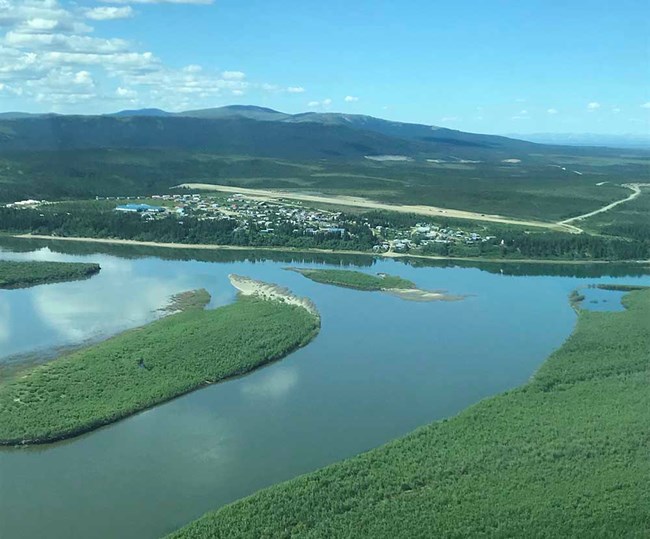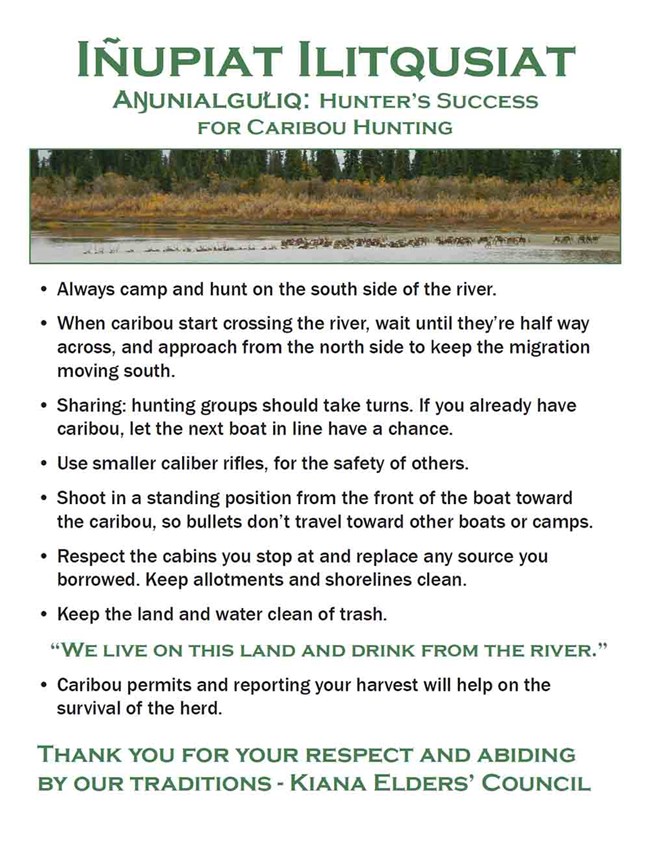Last updated: November 24, 2020
Article
Caribou Stewardship based on Indigenous Knowledge

The Iñupiat have relied on hunting the Western Arctic Caribou Herd (WACH) for centuries. The Alaska National Interest Lands Conservation Act (ANILCA) protects subsistence in national parklands and the National Park Service (NPS) participates in management of the hunt through federal subsistence management. The Iñupiaq subsistence hunters advise the federal subsistence management and continue stewardship practices based on inter-generational knowledge of the herd. To better manage the hunt and steward the WACH, the NPS supports Iñupiaq stewardship through the Caribou Hunter Success Working Group.
The Caribou Hunter Success Working Group was created by the Kobuk Valley Subsistence Resource Commission after members of the NPS commissions expressed concern that some hunting practices are dangerous to hunters on the river. Boats and snowmachines are used during the fall and winter hunts. Hunters are more concentrated around large communities and in good hunting spots, such as river crossings. The concentration of hunters has increased pressure on the herd and created potential dangers for other hunters.

The Caribou Hunter Success Working Group goal is to work together with the tribes of northwest Alaska, Maniilaq Tribal Government Services, NANA Alaska Native Regional Corporation, US Fish and Wildlife Service Selawik National Wildlife Refuge, Alaska Department of Fish and Game, and regional/local Elders Councils to utilize existing avenues of communication to spread existing information to tribal communities to promote safe hunting and traditional stewardship practices. In two cases, caribou hunting education was addressed by sharing a flyer with short-hand descriptions of traditional stewardship practices.
From 2017-2019, Maniilaq Tribal Government Services worked with tribes to host community meetings with caribou hunters before the hunting season. Agencies worked together to provide the currentregulatory information and caribou population updates. The meetings were an opportunity for community discussions on traditional stewardship practices. This collaborative effort results in more effective management of the caribou herd because NPS managers learn from Iñupiaq inter-generational knowledge of the herd and it presents an opportunity to educate hunters on both systems of management.

Mobilizing Indigenous Knowledge through the Caribou Hunter Success Working Group
Abstract
The caribou stewardship practices of the Iñupiat have persisted through cycles of abundance and decline for the Western Arctic Caribou Herd (WACH). This research seeks to address the challenges and opportunities faced when mobilizing Indigenous Knowledge in the National Park Service (NPS) management of the herd. Motivated by Indigenous stewardship concerns, NPS staff facilitate and participate in an informal working group focused on caribou hunter success. Using Indigenous Knowledge methods, this study examined the outcomes of the working group and the use of “rules of thumb” to identify and share stewardship practices. In the two cases, the Caribou Hunter Success Working Group created space for subsistence hunters to develop educational materials based on Indigenous Knowledge to address specific hunter success issues. Subsistence users participate in the federal subsistence programs and related subsistence forums, and it is the work of the NPS to mobilize the knowledge they contribute to improve subsistence management for both the users and the resource. There are two additional benefits for the NPS: (1) a better understanding of the use of the resource, and (2) when regulations are informed by Indigenous Knowledge, there is a greater likelihood of adherence. The mobilization of Indigenous Knowledge leads to more effective management.
Atkinson, H. 2020. Mobilizing indigenous knowledge through the Caribou Hunter Success Working Group. Land 9(11): 423.
